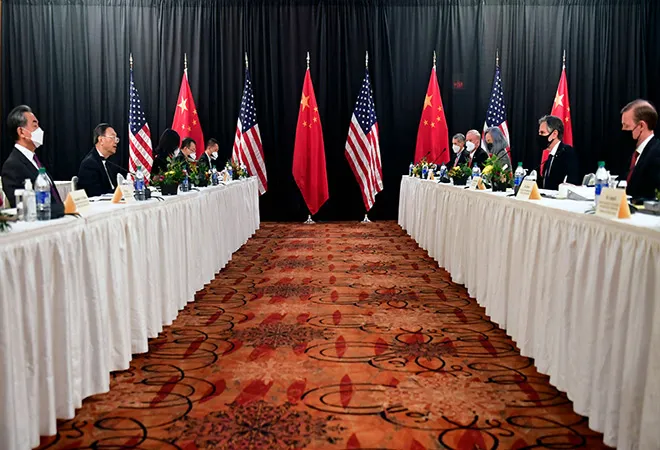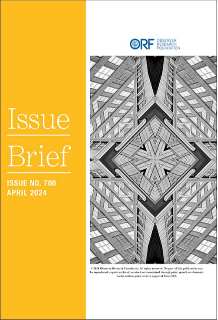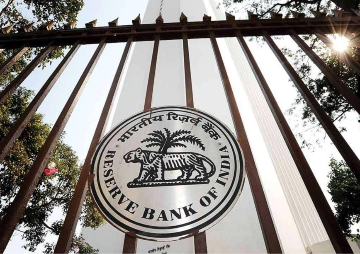
The US Secretary of State Antony Blinken and National Security Adviser Jake Sullivan’s
meeting with China’s top diplomats Yang Jiechi and Wang Yi at Alaska has been in the news for its acrimony and fireworks. However, China has used the summit to its advantage, targetingAmericanexceptionalism—its democracy and espousal of human rights.
According to the Chinese zodiac, 2021 is the‘Year of the Ox’, which signifiesresilience and prosperity through hard work and sincerity. While the Chinese Communist Party(CCP)marks the centenary of its formation,it is keen to push the narrative thatjuxtaposes a “weak”imperial China against a “strong” People’s Republic. The Qing was the last dynasty that ruled over China, and it is during this phase that nations like the US, UK, Japan, and Russia, amongst others, invaded and enfeebled it. Debates in the nation in the run-up to the centennial celebrations have focussed on the need toput forth a “success story” that is an exemplar of China’s strength.Xi Jinping wants to push the narrative that the “Chinese miracle”has been possible only because of the role played by the CCP in guiding the Chinese people.The Qing dynasty comprised of the Manchus, an ethnic minority in China, which ruled over the majority Han Chinese. This tacitly pushes the notion that China’s exceptionalism is due to its racial superiority.State-media has contrasted China’s historically“timid” counter toforeign powers with the CCP’s robust riposteat the
Alaska meeting.
In the centennialyear, the Central Commission on Politics and Legal Affairs has been tasked with spearheading the‘Party History Study Campaign’, which aims at binding together the “people and the CCP”. The
campaignintends to use history effectively to “administer the country”and “educate citizens”. Under the initiative, students will be taken on tours to “revolutionary sites” and museums to increase their “appreciation of the CCP’s struggle”. Xi wants to
strengthen the confidence of the ordinary Chinese in its governance system. He has said that, “There are people who think that reform and opening up is the same as adopting Western universalist values and political systems…our reform is one that will have Chinese characteristics.”
At the summit, Yang Jiechiboldly put forth his nation’s
ideal of a “Chinese-style democracy” as a counter to America’s.This new-found confidence can be traced to the fractious political divide in America. Early this year, Donald Trump’s supporterstried to overturn his defeat in the 2020 United States presidential election by disrupting the joint session of the Congress gathered to count electoral votes to formalise Joe Biden’s victory. Speaking at a session of the Central Political and Legal Affairs Commission, its chief
Chen Yixin said that China’sgovernance systemwas primarily responsible for its rise, and conversely,the West’s decline was a result of its political system. Its narrative that the ‘East is rising, West declining’ (东升西下), indicates that China is eager to profit fromAmerica’s apparent disarray.What China has carried outuntil now in a low-key manner, it intends to push with greater conviction—its governance system. Atthe 19
th Party Congress, Xiasserted that China had entered a “new era”, when its model would offer a new option for other countries and nations eager to speed up their development while preserving their independence.
The CCP was in talks with the African National Congress, the ruling party in South Africa, to build an
instituteto train cadres.The
leadership training instituteis on the lines of the China Executive Leadership Academy in Shanghai, where CCP leadersare schooled in China’s governance practices and Marxist theory. China offers political training programmes for
ruling parties inTanzania, Zimbabwe, and Namibia. Under the‘China–Africa Action Plan 2018–2021’,
China providesprofessional training opportunities and government fellowships to nearly 100,000 civil servants,out of which 5,000 seats are earmarked for servicemen. Creating links between the CCP and other one-party states help further its authoritarian model of governance and gain influence at the highest levels of government. Here, China has a strategic edge over the West, which has on occasion upbraidedAfrican governments over human rights violations.
Human rights is a key tenet of US foreign policy, and China is trying to blunt America’s edge after its recent election as a member of the UN Human Rights Council. Days before the Alaska summit, the Council slammed the US’s
human rights record, highlighting racial discrimination of African-Americans and Muslim refugees due to the rise of “White supremacy”. The council also
heard that America’s campaign to combat terrorism had caused over 800,000 casualties and displacement of nearly 21 million people. Xin Qiang, the deputy director of the Center for American Studies at Fudan University, has accused conservative
media outlets of provoking attacks on Asians. This signals China’s intent to play an active role as the voice of Asians residing in America and those nations aggrieved by the US to influence the debate on human rights.
A major factor in the United States victory inthe Cold War against the Soviet Union was the appeal of its political system and values. In its conflict with America, China is trying to make its cultural and political values attractive to its people and in parts of the world, and taking a leaf out of Reagan’s book and trying to paint America as an “evil empire”. President Joe Biden will have to counter China at a cultural level.
The views expressed above belong to the author(s). ORF research and analyses now available on Telegram! Click here to access our curated content — blogs, longforms and interviews.



 The US Secretary of State Antony Blinken and National Security Adviser Jake Sullivan’s
The US Secretary of State Antony Blinken and National Security Adviser Jake Sullivan’s  PREV
PREV


